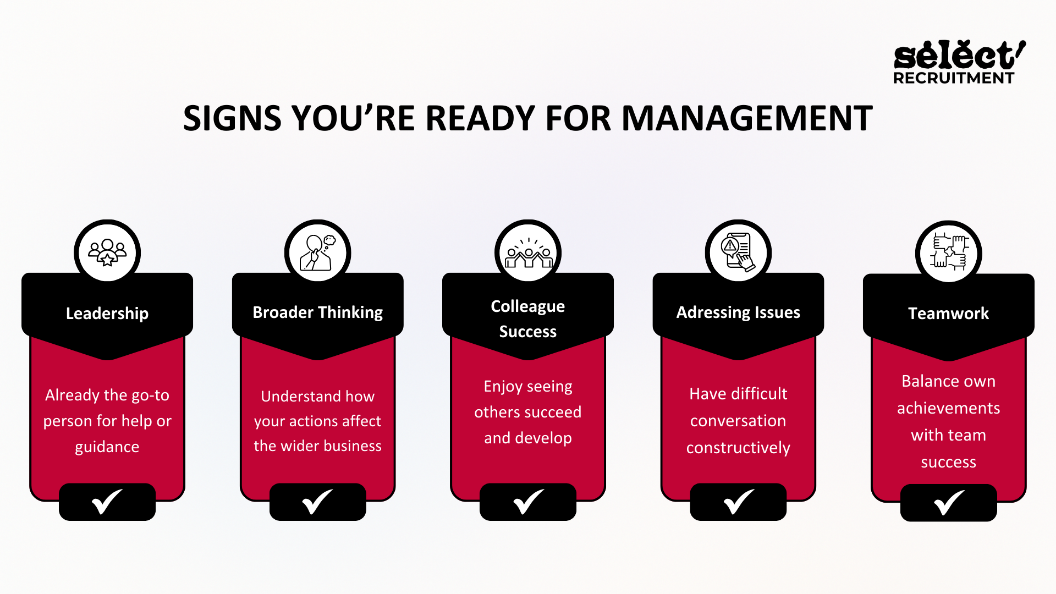Have you ever found yourself wondering if you're ready to step up to a management role? That mix of excitement and uncertainty is something I see regularly in my work as a recruitment specialist.
With over 20 years of helping candidates make this crucial career transition, I've noticed certain patterns that separate those who thrive in leadership from those who struggle. Let me share what I've learned about the journey to management in today's workplace.
What Management Looks Like in 2025
The days of managers simply delegating tasks and monitoring performance are long gone. In my conversations with hiring managers across various sectors, it's clear that today's leaders need a broader skill set. Modern management now involves:
Building and guiding high-performing teams who can adapt to change quickly. This means less micromanagement and more coaching.
Making strategic decisions that align with business objectives while considering the human impact.
Communicating effectively across different levels – from team members to senior executives and stakeholders.
Using data to drive decisions while still trusting your experience and instinct.
The specifics vary between industries. A marketing manager might focus on campaign strategy and creative direction, while a construction technical manager might concentrate on project specifications and quality control. But the core leadership principles remain consistent.

Why Good Management Matters
Companies increasingly recognise that effective management directly impacts business performance. When placing candidates in management roles, I find that organisations specifically look for people who can:
Create environments where teams feel engaged and motivated
Spot and develop talent within the organisation
Drive innovation and improvement
Resolve problems before they escalate
Use resources efficiently
These factors translate into measurable business outcomes – higher productivity, better retention, stronger customer relationships, and ultimately, improved financial performance.
How to Know You're Ready for Management
Are you already showing signs of leadership potential? Based on my experience placing successful managers, here are some reliable indicators:
You're the go-to person when colleagues need help or guidance. This informal leadership role often precedes official management positions.
You think beyond your immediate tasks to understand how your work fits into broader business goals.
You genuinely enjoy seeing others succeed and take satisfaction in contributing to their development.
You can have difficult conversations constructively – addressing issues without damaging relationships.
You balance getting results with supporting people – recognising that sustainable success comes through your team, not despite them.
If several of these points describe you, you might be ready for the next step.

Essential Skills for New Managers
The transition to management requires developing new capabilities. Focus on building these five core skills:
Strategic thinking – Moving from tactical execution to bigger-picture planning. Practice by asking "why" questions and considering long-term implications of decisions.
Delegation – Many new managers struggle with letting go of tasks they previously excelled at. Effective delegation means matching the right work to the right people and providing appropriate support.
Performance management – Learn to set clear expectations, give constructive feedback, and have structured conversations about development.
Financial understanding – Even if you're not in finance, you'll need to understand budgets, resource allocation, and how your decisions impact the bottom line.
Adaptive communication – Different situations and audiences require different approaches. Develop the flexibility to adjust your communication style accordingly.
Building Management Experience Before Promotion
How do you gain management skills before you have the title? I often advise candidates to:
Take on project leadership – Volunteer to coordinate initiatives where you can practice planning, delegation, and follow-through.
Mentor newer team members – This builds your coaching skills and demonstrates your commitment to developing others.
Participate in cross-departmental work – This helps you understand different perspectives and practice influencing without authority.
Seek formal training – Consider management courses or qualifications from bodies like the Chartered Management Institute.
Ask for additional responsibilities – Have an open conversation with your manager about your aspirations and request opportunities to stretch yourself.
First-Time Manager Challenges
Having placed many professionals in their first management roles, I've seen the hurdles they can typically face:
Managing former peers – This transition can be awkward, and it is where many management pitfalls can occur. Be clear about the expectations of your new position, while maintaining the respect and relationships you've built.
Finding your own style – You won't succeed by copying others exactly. Observe what works but develop an approach that fits your personality, team makeup, and values.
Time pressures – New managers often feel pulled in all directions. Prioritisation becomes even more important than before, as you hold more of the responsibilities for deadlines and delivery.
Switching mindset – Moving from being a doer to an enabler requires a significant mental shift. It can be hard to let go of tasks that you know you can easily complete, but remember that your success is now measured through your team's achievements.
Handling performance issues – Addressing underperformance is uncomfortable (especially when it comes to your former peers), but necessary. Seek advice from HR or experienced managers when needed.
Is Management Right for You?
Not everyone needs to become a manager to have a fulfilling career. The world of management doesn’t suit all tastes, and any organisations now offer specialist career paths that provide progression opportunities without people management responsibilities.
Ask yourself:
Do you genuinely enjoy working with and developing others?
Can you find satisfaction in achieving results through a team rather than your individual work?
Are you comfortable making difficult decisions that affect others?
If these questions raise doubts, you might be happier as a specialist or individual contributor – roles that are equally valuable and often well-compensated.

Industries with Growing Management Opportunities
If you’re considering getting in to management, it’s good to know where the opportunities are. Based on current recruitment trends, several sectors offer particularly strong paths to management:
Technology – The continued growth in tech means companies need managers who can lead technical teams while understanding business objectives, and deliver projects within time and budget limits.
Healthcare – An ageing population and healthcare innovations create demand for managers who can balance care quality with operational efficiency.
Finance – Regulatory changes and digital transformation are creating new management roles in financial services.
Construction – The infrastructure boom means technical managers who understand sustainability and complex project management are highly sought after.
Marketing – The shift to digital and data-driven marketing creates opportunities for managers who can blend creativity with analytics, providing clear, actionable strategies that drive growth.
Taking Your Next Steps
If you're considering a move into management, I recommend:
Have an honest conversation with your current manager about your ambitions
Identify specific skills gaps and create a development plan
Look for opportunities to demonstrate leadership in your current role
Update your CV to highlight relevant experiences
Build relationships with managers in your field to understand the day-to-day reality
At Select Recruitment, we work closely with both employers and candidates to find the right management fit. Our experience across multiple sectors means we can provide valuable guidance on your management career path, whether you're ready for a move now or planning for the future.
Ready to explore your management potential? Get in touch with our team for a confidential discussion about your career aspirations.
.png)


.png)
